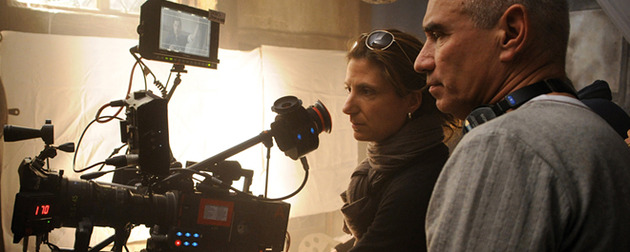Roland Emmerich on Anonymous — 'The Single Greatest Filmmaking Experience of My Life'
What are the broader visual influences? It's very painterly, loaded with candlelight shot by Anna Foerster, who I know has worked with you before but I hadn't heard of before this--
It's her first film.
Amazing.
The visual thing, I mean... Anna and I have worked together forever, but she always had to kind of imitate -- as a second-unit cameraperson or second-unit director -- other people's work. And I always realized how good she is because of how well she imitated other people's work. At one point I said, "Don't you want to do a film yourself?" She said, "I would love to, but what I really want to do is direct." And right now, she is an accomplished, busy director for TV shows. Naturally she wants to go into film. And for her, it's not only making a movie, but telling a story. The images have to mean something. And she was very, very instrumental for the look of the film. She constantly brought me paintings she liked. We studied them, and you'd realize with, say, Vermeer, there's this amazing light. How does he create that light. We realized that it's super-soft northern light, which is probably his atelier, and the rest is really just candles.
Then some miracle happened: The first digital camera with an 800 ASA chip. It sounds very technical, but this is a camera where you can shoot with pretty much one candle in a room and get an image. And when you came to the sets, the sets were darker than the surroundings. Even daylight scenes were so darkly lit that you actually saw the reflection of fire in the shadows of your face -- which, in essence, happens. But a normal camera cannot record that. These cameras can.
How long have you shot digitally?
Since 2012. This is my second.
And you're done with film? You wouldn't go back?
No. Why?
Gotcha. So one of your actors, David Thewlis, has referred to you as a "mischievous man." Obviously Id have to ask him to define that more specifically, but would you generally agree or disagree with that characterization?
Yeah, I am somebody who always likes to be mischievous. I am. When you look at my other films, people don't see it, but I see little stabs at things in there. For example in Godzilla, I made the mayor Roger Ebert and [his assistant] Gene Siskel -- "Two thumbs up for New York!" -- because they gave me two bad reviews. I only heard about them, but I said, "OK! Let's..." You know? [Laughs] So I'm fearless that way.
Also, I remember when I discussed with [Independence Day writer] Dean Devlin what building we should blow up in Washington. He said, "Oh -- the Capitol." And I said, "No, no, no -- the White House." And Dean said, "You can't blow up the White House!" I said, "Why not?" It's these taboos I'm really attracted by. When something is a taboo, I want to do it.
How is Anonymous a taboo?
The whole question of saying Shakespeare didn't write Shakespeare is the taboo. But I'm in very good company, believe me.
Yeah, that's what I mean.
Sigmund Freud.
Mark Twain.
Mark Twain. Walt Whitman. In these days, there's Mark Rylance, Sir Derek Jacobi... to only name a few. They always try to make it look like we're a bunch of idiots and conspiracy theorists, but we're not.
Fairly or unfairly, you're know as a very visual director -- more than, say, an actor's director, or a dramatic director. Did you take on Anonymous in part to countermand that perception?
I'm not thinking like that at all. That's not the reason to make a film -- to show off something that you can do or cannot do. Most of the time that you feel passionate about something -- about the subject matter. For example, I feel very passionate about what I'm doing next: Singularity.
What is it called?
Singularity. You should check it out on the Internet. It's a zeitgeist word right now; there are singularity conferences everywhere.
I know the basic concept: the integration of technology and humanity.
Right. It's my next film. And again, I'm just fascinated by it. I've been reading for years and years about it. The same thing with this. I read the script; I was fascinated. I started reading more and more and more. I actually made The Day After Tomorrow, and then I came back to talk to [screenwriter] John Orloff. Then I bought the script. I surprised him when all of the sudden I knew more than he did. He just kind of said, "Oh, shit."
With things like Anonymous and Singularity, then, do you feel like you're transitioning into a new stage of your career? Maybe smaller films, or films about certain ideas as opposed to that four-quadrant blockbuster stuff?
No, it's not that at all. I still want to do blockbusters. Singularity is a very expensive film.
What's expensive about it?
We're creating a future like 45 years ahead. Every car is different. Things like that. And it takes place in three or four cities around the world, and it is an action movie -- it has to be, because it's a four-quadrant movie. It has to have a lot of action and big images. That costs money. But whatever. I also would, every once in a while, love to do an Anonymous in between, because it's where you reconnect with how to make a film: With your hands.
Read Stephanie Zacharek's review of Anonymous here, along with Movieline's interview with Rhys Ifans here.
Follow S.T. VanAirsdale on Twitter.
Follow Movieline on Twitter.
Pages: 1 2


Comments
I found the movie to be heavy-handed, especially when Emmerich had The Globe Theater crashing down onto The Groundlings because of his opposing the use of contractions.